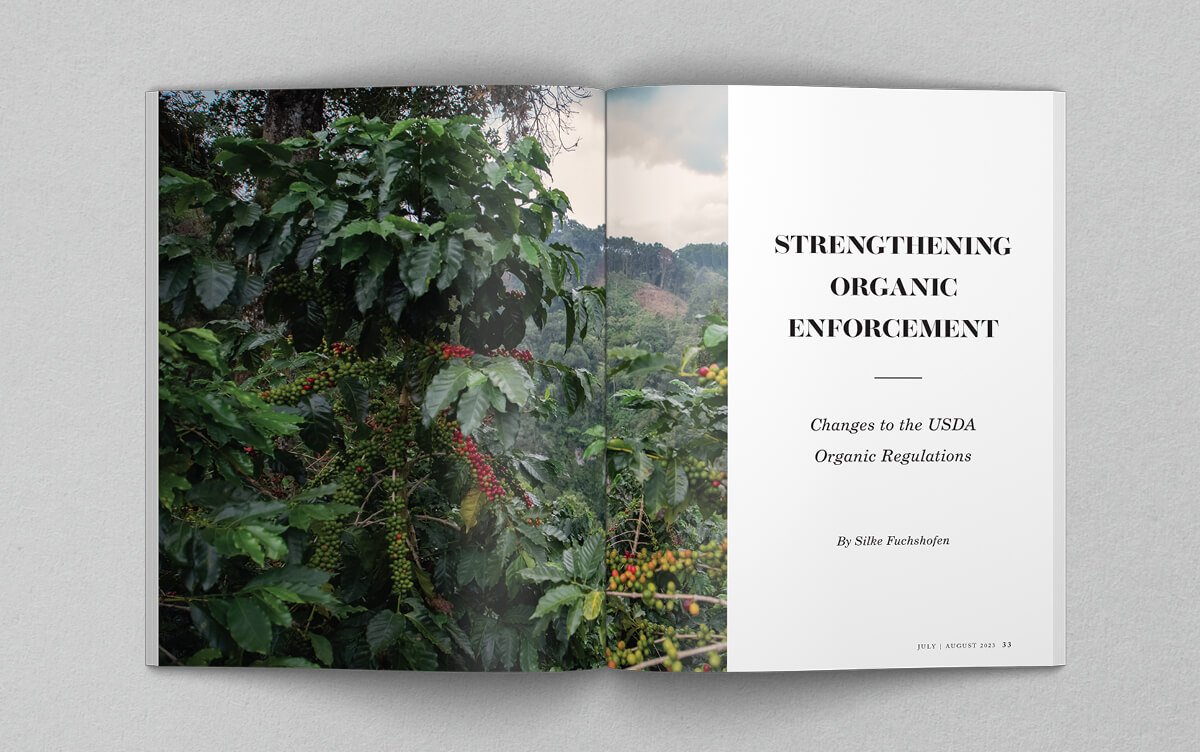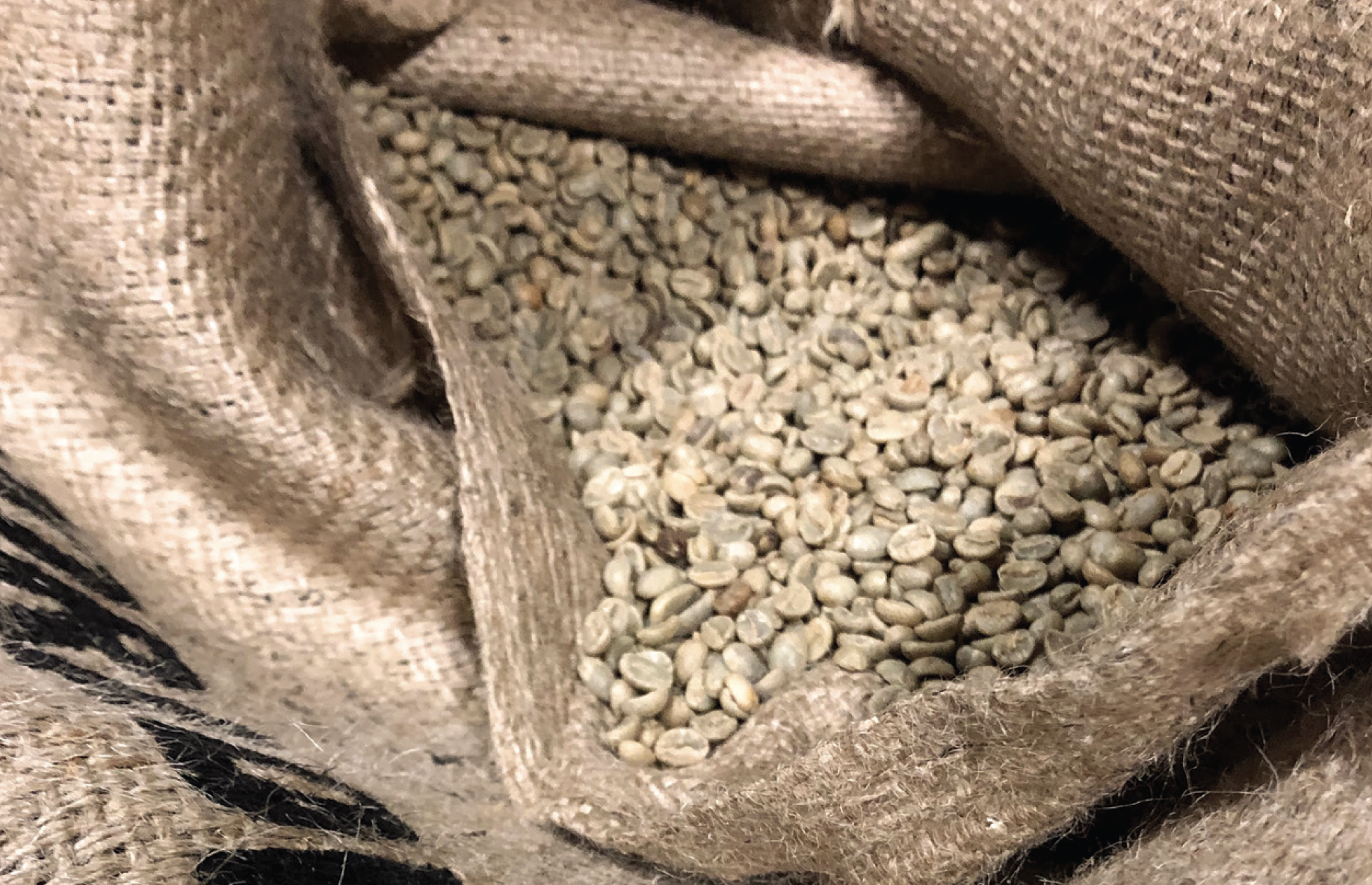Strengthening Organic Enforcement: Changes to the USDA Organic Regulations
By Silke Fuchshofen
Long-anticipated changes to the National Organic Program (NOP) went into effect on March 20, 2023, expanding the oversight and enforcement of the production, handling and sale of organic products. The U.S. Department of Agriculture’s (USDA) Strengthening Organic Enforcement (SOE) rule amends organic regulations to protect the integrity of the organic supply chain and improve farm-to-market traceability. The changes seek to provide a level playing field for organic farms and businesses.
Since the USDA organic regulations went into effect in 2002, the organic market has seen tremendous growth. Consumer demand has risen, many more businesses are participating in the organic market, and supply chains have gotten increasingly complex. In 2013, organic food sales in the United States were around $31 billion. Nine years later, in 2022, they had nearly doubled to $61.7 billion. This includes roughly $2.3 billion for coffee, up by almost 7 percent from the year before.
Photo by Juan José Sánchez Macías
At the same time, because the organic label fetches higher prices, the program has also attracted fraud. In the past several years it became clear that some gaps in oversight and enforcement needed to be addressed, including multiple recommendations by the National Organic Standards Board (NOSB) and the implementation of provisions of the 2018 Farm Bill, which required the USDA to stipulate that all entities in the global organic supply chain become certified. The new regulations better allow identification of fraudulent organic certificates and clarify that the NOP may initiate enforcement action against any violator of the Organic Food and Production Act, including uncertified operations and responsibly connected parties.
The regulation changes affect the organic coffee industry in different ways. Most notably, as of March 19, 2024—the implementation date of the SOE rule—all sales brokers, commodity traders, importers and exporters of organic coffee will have to be certified, and exports will need to be accompanied by import certificates issued by the operation’s organic certification agency.
Organic production methods are designed to improve environmental sustainability, and consumers pay a higher price to support that—along with the proven and/or perceived health benefits. Preserving strong consumer trust in the organic label is the ultimate goal, so it is important that organic operations throughout the supply chain maintain the integrity of organic products on a day-to-day basis.
Importers, Exporters and Brand Owners
Sales brokers, commodity traders, importers, exporters and brand owners used to be excluded from the requirement of organic certification. They were able to arrange the sale and movement of certified goods by sending the producer’s organic certificate, or the certificate of the last certified entity, which could be a certified exporter, importer or other trader. The thought behind the exclusion was that entities who do not physically come in contact with the product do not have to be concerned about commingling or processing mistakes. But this rule also made it difficult for buyers of organic raw materials to know what was required, and sometimes the wrong certificates were collected. With the new SOE rule, that is changing.
Green coffee. (Photo by Juan José Sánchez Macías)
The elimination of these exemptions may be the most impactful change for the U.S. organic coffee industry. In the United States, many who trade organic coffee already hold organic certification, either voluntarily, or because it has been requested by a certified organic customer. Many of these traders and brand owners knew the SOE changes were coming, but not all—and probably least prepared are exporters in producing countries who only occasionally sell organic coffee. Starting on March 19, 2024, these exporters will have to have their own USDA organic certificates, and each export will require an organic import certificate from the exporter’s organic certifier.
Customs brokers remain exempt, but companies loading and unloading goods that are not in tamper-proof packaging do need organic certification going forward. Warehouses are exempt only if they receive, maintain and ship organic material in the same unopened tamper-proof packaging or container. Are burlap bags with plastic lining considered tamper-proof? This may be one of the open questions.
Import Certificates
With the implementation of the new regulations, all exports to the United States will require an NOP import certificate. The exporter needs to request it from their certifier. The necessary information is entered into the Organic Integrity Database which generates the certificate.
The data included on the NOP import certificate must be entered into the U.S. Customs and Border Protection (CBP) Automated Commercial Environment system. The importer must verify that the shipment has had no contact with prohibited substances or exposure to ionizing radiation since export. A documented organic control system must be in place to conduct this verification. Organic imports have to be identified and marked as organic on all import documents, such as invoices, packing lists, bills of lading, and CBP entry data. This import certificate procedure is one of the core elements of the new rule, intended to increase oversight and strengthen organic integrity by improving traceability to the port of entry and ensuring an auditable record trail.
Preserving consumer trust in the organic label is key to the success of the program. (Photo by Juan José Sánchez Macías)
Exemptions for Retailers and Roasters
Retail establishments that process organic agricultural ingredients can be exempt from the requirement of organic certification, but only if processing and point of final sale are in the same location. A roaster could be exempt and sell coffee labeled as “organic,” but not as “certified organic” with the USDA seal. This roaster would be able to sell the roasted coffee labeled “organic” only to customers at its own location or online, but not to another retail store or through other store locations. Recordkeeping requirements still apply for three years beyond their creation. Exempt operations still must be able to demonstrate organic identity and verify quantities upon request by representatives of the U.S. Secretary of Agriculture.
Traceability
The new regulations are more specific in terms of recordkeeping and traceability practices. Inspectors conducted trace-backs and mass balances in the past as verification tools. Now they are officially required in the regulations. (At a roasting facility, a trace-back would be similar to a mock recall but geared toward organic verification. The lot number on a finished product is used as the starting point and followed through all sales, processing and purchasing documentation to see if tracing back to the raw material purchase, supplier and supplied lot number is possible. A mass balance compares the amount of purchased raw material and the amount of finished product containing this raw material in a certain time frame. Beginning and ending inventories, the percentage of ingredient contained in the finished product and production losses are all considered in the calculation.)
As a result of the new rule, certifiers will most likely expand their organic system plan templates to better assess vulnerabilities, and all certified organic operations are encouraged to actively participate by improving traceability and contributing to strengthened organic integrity.
New rules will require all actors in the organic supply chain to be certified. (Photo by Juan José Sánchez Macías)
Nonretail Containers
Under the new regulations, nonretail containers that are used to ship or store organic products will need to be clearly labeled to show the organic identity of the coffee (e.g., “organic green coffee beans”). Before, the only domestic requirement for nonretail containers was the lot code. That seemed sufficient in the beginning but was later identified as a weakness. Going forward, the container needs to show the lot code as well as identifying the organic material. The container will need to be linkable with the audit trail documentation, and the operator needs to document how the finished product is fully traceable back to the bulk raw material. An organic inspector will verify that this requirement is fulfilled.
Inspections
The new rule states that every certified operation must be inspected not only every year but once per calendar year. This change will mainly mean that stricter administrative procedures are required from the certification agency, but it also means that you may not be able to postpone inspections that are scheduled for late in the calendar year.
The amended regulations also mandate that 5 percent of certified operations receive an unannounced inspection every year. This has been a recommendation in the past and may therefore not be a significant change, but now it is mandatory. The unannounced inspection can either be a partial inspection that focuses only on specific areas, or it can replace the usually announced annual inspection if it complies with those requirements.
Green coffee in burlap. (Photo by Connie Blumhardt)
Organic Certificates
Operations that have handled organic products can attest to the misconceptions around the information on organic supplier certificates. The new regulations are addressing this by standardizing organic certificates, which will be generated in the Organic Integrity Database. Only the addendum to the certificate—those pages that list products, brand names and international standards—will still be generated within the certifier’s systems. In addition, there are now instructions on what needs to be included in the addendum, and it must be clearly linkable with the standardized organic certificate.
The Organic Integrity Database
The Organic Integrity Database has been a useful resource for years, and with the SOE rule changes, it will become even more important. One can search the Organic Integrity Database (organic.ams.usda. gov/integrity) for certified commodities, certifiers by country, and to check if a supplier is listed. Should you receive an organic supplier certificate but the operation is not listed in the Organic Integrity Database, it is a good idea to inform the certifier right away as it might be a counterfeit. With the added functionality of generating all operations’ organic certificates and being the hub for import certificate data, this website will be central to the management of organic certification information.
Coffee drying on the patio. (Photo by Juan José Sánchez Macías)
Grower Group Certification
Another big change is that the requirements for grower group certification are now included in the regulations. Previously, the grower group certification requirements were governed by a USDA Policy Memorandum and by NOSB recommendations. This change will lead to improved clarity and will also enable better enforcement.
Producer group certification is possible if all members use the same resources and input materials; they may not purchase from outside the grower group. Members may only sell through the grower group, unless their operation has its own certification. A grower group has only one organic system plan (OSP) that is binding for all members and includes an internal control system (ICS) by which the organization can verify that its members adhere to the OSP. Part of the ICS’s responsibility is to conduct an annual inspection at each member operation. These internal inspections also need to cover trace-back and mass balance audits.
During the annual organic inspection by the group’s organic certification agency, the inspector verifies the compliance and effectiveness of the ICS by visiting the organization’s offices as well as a prescribed group of members. Each member that has been determined to be high risk, at least one member of each production unit (grower groups are often divided into subgroups that are called units), each handling facility, and at least 1.4 times the square root or 2 percent of the total number of producer group members (whichever is greater) need to be inspected. Each agency that certifies grower groups needs to conduct unannounced inspections for at least 5 percent of those groups annually.
Roasting companies that work with organic coffee will need to obtain certification in most cases. Pictured: Nicolás Martínez at Cup of Excellence Mexico, 2022. (Photo by Juan José Sánchez Macías)
European Union Organic Regulations
The European Union (EU) organic regulations also underwent substantial changes, and while they may not directly affect coffee trading, roasting or retail businesses in the United States, they may do so indirectly. For example, there will be stricter legal distinctions between agricultural and nonagricultural operations. Previously, exporters were able to obtain one group certification for producer and processing facilities. Now the producer group has to be its own legal entity before it can get producer-group certification, and the processing facility has to obtain its own certification.
Also, under the new EU regulations, 5 percent of producer group members must get an annual organic inspection, and a sample will need to be taken and sent to a lab for residue analysis at 2 percent of the member operations. Both are significant increases, and costs for EU certifications are expected to rise substantially. If producers decide to drop EU certification but maintain NOP certification, as some suggest as a possibility, this could mean increased availability of NOP coffee in the U.S. market.
These are only a few specifics from the EU regulations, which will have to be implemented by December 31, 2024. (In countries that have an equivalency agreement with the EU, they will need to be implemented by December 31, 2026.)
Coffee retail operations should check the regulations to determine if organic certification is required. (Photo by Juan José Sánchez Macías)
Recommendations for Roasters and Traders
In light of the new SOE and EU rules, we offer the following suggestions for U.S.-based coffee businesses who work in or are interested in working in the organic sector:
If you run or work for a coffee trading business that works with organic coffee, you will need to obtain organic certification or discontinue trading organic coffee. If you decide to discontinue, let your trade partners know so they can make other arrangements.
If you are a certified organic roaster and get your organic coffee from uncertified suppliers, make sure they are aware of the regulation changes. Spreading the word will help avoid disruptions in the organic coffee business.
If you are a brand owner and contract out all manufacturing activities, you will need organic certification.
Certified operations may want to go over their recordkeeping procedures and test if all departments, including marketing, purchasing and receiving, align with the document traceability rules. Documentation needs to be reliably connected with nonretail containers in storage.
Change your bulk labels to include the identification “organic” along with the product name.
Check the regulations to determine if you need organic certification for your coffee retail or warehousing operation.
If your business is certified organic, keep an eye out for information from your organic certifier regarding the new rules and how they might affect you.
If you determine that you need or want organic certification, start the process as soon as possible. The organic industry is expecting a significant increase in certification applications over the next several months.
This article is intended to provide an overview of the recent changes to USDA organic rules. Organic certifiers are currently in the process of implementing the new requirements and expect further guidance from the NOP. For more information about organic certification and NOP rules and regulations, visit ams.usda.gov/rules-regulations/organic. If you are interested in more background information, see the Federal Register/Vol. 88, No. 12.
***
Silke Fuchshofen worked for a freight forwarding agency in Hamburg, Germany, before obtaining her BSc in agriculture. From 2009 to 2019, she conducted about 800 organic inspections for all kinds of processing and handling operations in the United States. The owner of Organic Insights, Inc., Fuchshofen conducts inspector and certifier trainings and internal audits, and provides consulting services for processing and handling operations that seek organic certification or reinstatement or want to improve their organic procedures. She can be reached at silke@organicinsights.com.
Advertisement


















